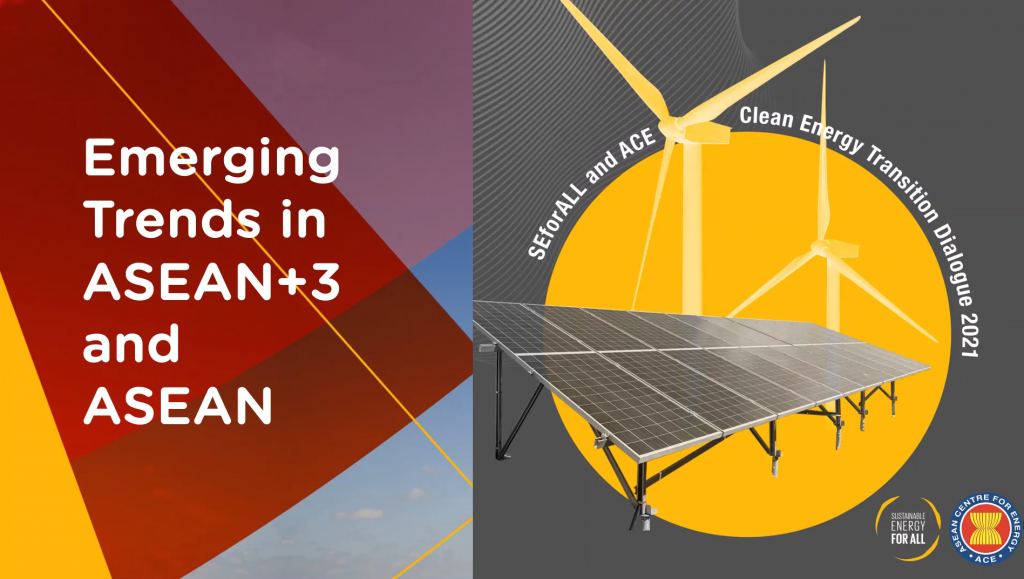Jakarta, 27 May 2021

On 27 May 2021, Sustainable Energy for All (SEforALL) in cooperation with ASEAN Centre for Energy (ACE) is organizing a virtual event entitled the Energy Transition Dialogue 2021: Energy Transition trends in ASEAN+3. The event was held as a platform for knowledge exchange with experts from think tanks, practitioners, and academia to get the latest updates on clean energy in ASEAN+3.
The host, Min Hyejung, Energy Specialist of SEforALL invited Ms. Tracey Crowe, Chief of Staff and Senior Director of SEforALL, to give the opening remarks for the event. Then, Dr. Nuki Agya Utama, Executive Director of ACE, in his keynote address emphasized the crucial points of why clean energy transition is important and how ACE is making effort to make it happen in the region.
Before the main session began, Mr Alvin Jose, Principal Energy Specialist of SEforALL, deliver the context and objectives of the roundtable. As ASEAN+3 countries are facing challenges to improve their energy security, increase energy diversification and reduce fossil fuel imports. Mr Alvin highlighted the importance and opportunities for ASEAN+3 countries in the global effort for climate action and SDG7 goals. The dialogue aimed to understand the major emerging trends within ASEAN+3 countries, to identify opportunities, to strengthen clean energy cooperation, to showcase progressive national/regional ambitions and the enabling mechanisms, and finally to learn from north-south and south-south experiences through sharing of opportunities, challenges, and lesson learnt.
The event was divided into two main sessions, first is the topic about carbon neutrality policy updates and potential clean energy pathways, second is the clean energy transition challenges and opportunities for ASEAN+3 cooperation. Mr Glenn Pearce Oroz, Director of International Relations & Special Projects of SEforALL, became the moderator for the first session. He welcomed Ms Monika Merdekawati, Research Analyst of ASEAN Climate Change and Energy Project (ACCEPT), to deliver the first presentation, sharing the outlook of clean energy in Southeast Asia according to the 6th ASEAN Energy Outlook (AEO6).
ASEAN Member States (AMS) have been consistently progressing their clean energy targets as set out under the guiding documents, ASEAN Plan of Action for Energy Cooperation (APAEC). Under the current policies and targets as projected by AMS Target Scenario (ATS), the regional target of achieving 23% renewable share by 2025 is out of reach. Hence, many could be done to bridge the gap as identified by APAEC Target Scenario (APS) to achieve such ambitious objective. To realise the clean energy pathway, ASEAN need a substantial investment of 367 billion USD in power sector. The AEO6 also estimated the positive multiplier effects from the decarbonisation efforts such as substantial job creations where the investment of solar and wind will add 220.000 jobs by 2025.
![[image] ASEAN Clean Energy Outlook](https://accept.aseanenergy.org/wp-content/uploads/2021/06/image-ASEAN-Clean-Energy-Outlook-1024x576.jpg)
Ms Monika Merdekawati from ACCEPT Share a Presentation about ASEAN Clean Energy Outlook
On October 26, 2020, the ambitious decarbonation plan and the green growth strategy in Japan was declared by prime minister Mr. Suga Yoshihide, where by 2025 Japan will reduce GHG emission to net zero to realise a carbon neutral society. Japan’s representative, Mr Motofusa Murakami, Managing Director of Energy Conservation Centre Japan (ECCJ), delivered the country’s decarbonation plan challenges such as the analysis for the large shields emission sector and securing investment for new technology. To induce the investment, Japan set an ambitious roadmap to realise the carbon neutrality by 2050 where the specific implementations are still under discussion by the specialists by considering the latest long-term energy plan, namely the 3E+S.
Meanwhile, President Xi’s of China gave a statement that the country aimed to peaking before 2030 and achieve carbon neutrality before 2016 at the general debate of 75th United Nations General Assembly (UNGA) on 22 September 2020. China’s representative, Dr Wang Yi, Vice President and Professor of China Academy of Sciences (Institutes of Science and Development), mentioned the major tasks of deepening green development and harmonizing man and nature. The first major task is to accelerate the green transition of development pattern and establish an economic system with green, low carbon, and circular economy, the second task is to build modern energy system: clean, low-carbon, safety, high efficiency, and ensure the capacity of supply, the third task is to form a new pattern for developing and protecting China’s geographical space, and finally to continuously improve the environmental quality.
The last presentation for the first session was from Mr Sung-hoon Kim, Director of Renewable Energy Policy Division of Korea Energy Agency (KEA). He shared the South Korea’s carbon neutrality roadmap by 2050. The government is committed to push the decarbonisation in all areas of economy and society, including industry, transportation, building and land.
The panellist session was chaired by Ms Ksenia Petrichenko, Economic Affairs Officer, UN ESCAP, she invited Ms Sirpa Helena Jarvenpaa, Director of Southeast Asia Energy Transition Partnership to give the first statement for the panellist session. Ms Sirpa sees the potential for increasing original clean energy collaboration in light of these trends towards the carbon neutrality by bringing the stakeholders together and translating the commitments into the actual policies and the clean energy program. The other panellist: Dr Wang Yi, Mr Sung-hoon Kim, Mr Motofusa Murakami, and To Nhien Ngo, Executive Director, Vietnam Energy Transition Initiative, Vietnam, also gave their statement in this panellist session.
The clean energy pathways adopted by China, Japan. and South Korea can also have a potential impact on the adopted solutions in the global south, especially in southeast Asia. These three countries are members of ASEAN+3 cooperation framework and support the regional integration and cooperation of the ASEAN members states and support the efforts under APAEC.
ACE, including ACCEPT, is actively supporting the ASEAN Member States to work together with key dialogue partners and international institutions, such as SEforALL in achieving the regional clean energy transitions, which is in line with the global concerns of climate change.
JKH